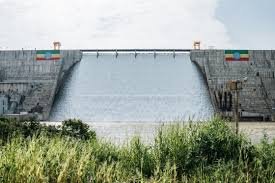Ethiopia just inaugurated Africa’s largest dam to boost its economy, end frequent blackouts, and support the growth of electric vehicle development in a country that has banned the importation of gasoline-powered vehicles.
As reservoir waters flowed into the turbines of the Grand Renaissance Dam, Ethiopians dressed in colorful regalia viewed the ceremony on large screens across the capital, Addis Ababa, and celebrated the achievement with dancing to traditional music.
“We will have enough power to charge our electric vehicles from the new dam,” said Belay Tigabu, a bus driver in Addis Ababa’s main bus terminal.
Read also:
- NADF partners with Katsina, OCP Africa, others to launch 50-hectare All-Season Demonstration Farm at Sabke Dam
- Burna Boy acquires Africa’s first Lamborghini Revuelto hybrid
- 2Face’s ‘African Queen’ tops the Billboard Best Afrobeats Songs of All Time list
The almost $5 billion mega-dam, located on the Blue Nile tributary of the Nile River near Ethiopia’s border with Sudan, will produce more than 5,000 megawatts and is expected to double national electricity generation capacity, according to officials
Ethiopia’s largest hydro-electric dam funding has caused tensions with Sudan and Egypt.
To finance the project, Ethiopia has relied on government bonds, bank contributions, and public fundraising, including salary deductions and diaspora bonds, while the World Bank and IMF opted out.
Funding for the dam project came solely from Ethiopia, as international lenders opted out.
This highlights the potential for African countries to achieve major goals using local resources. The project was contracted to the Italian firm but supervised by the Ethiopian Electric Power Corp
Ethiopia’s Prime Minister Abiy Ahmed, speaking during the launch, said the dam was a “big achievement” that would show the world what Africans are capable of accomplishing.
Dozens of visiting African heads of state and government joined Abiy for the inauguration, with many expressing interest in importing power from Ethiopia.
“I am proud to announce we will soon be signing an agreement with the government of Ethiopia to receive electricity from the dam that will benefit our hospitals and schools,” said South Sudan’s President Salva Kiir.
Kenyan President William Ruto said his nation is looking to sign a power purchasing agreement with Ethiopia based on the resources of the dam project, which he said was a “pan-African statement.”
Already an importer of Ethiopian electricity, Ruto said Kenya is seeking to alleviate the electricity deficit his country is experiencing.
He said the dam “exemplifies the scale and ambition of African-led infrastructure and aligns with the African Union’s vision of continental energy connectivity.”






